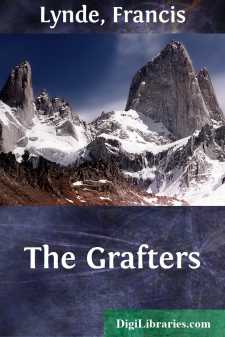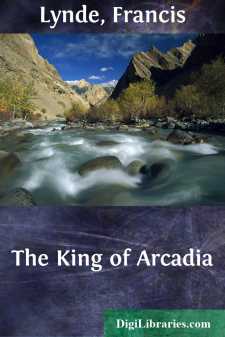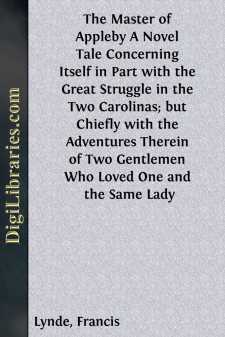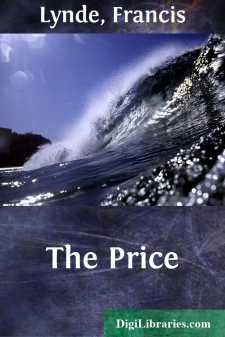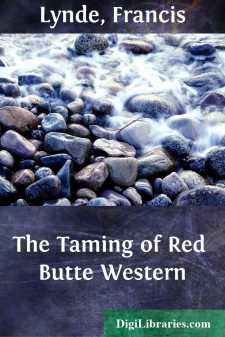Categories
- Antiques & Collectibles 13
- Architecture 36
- Art 48
- Bibles 22
- Biography & Autobiography 813
- Body, Mind & Spirit 142
- Business & Economics 28
- Children's Books 14
- Children's Fiction 11
- Computers 4
- Cooking 94
- Crafts & Hobbies 4
- Drama 346
- Education 46
- Family & Relationships 57
- Fiction 11829
- Games 19
- Gardening 17
- Health & Fitness 34
- History 1377
- House & Home 1
- Humor 147
- Juvenile Fiction 1873
- Juvenile Nonfiction 202
- Language Arts & Disciplines 88
- Law 16
- Literary Collections 686
- Literary Criticism 179
- Mathematics 13
- Medical 41
- Music 40
- Nature 179
- Non-Classifiable 1768
- Performing Arts 7
- Periodicals 1453
- Philosophy 64
- Photography 2
- Poetry 896
- Political Science 203
- Psychology 42
- Reference 154
- Religion 513
- Science 126
- Self-Help 84
- Social Science 81
- Sports & Recreation 34
- Study Aids 3
- Technology & Engineering 59
- Transportation 23
- Travel 463
- True Crime 29
Francis Lynde
Francis Lynde was an American author known for his engaging novels, often set against the backdrop of the American West and focusing on themes of adventure and human resilience. Born in 1856, he published several popular works during the early 20th century, including titles like *The Book of the American West* and *The City of Gold*. Lynde's storytelling was characterized by vivid descriptions and well-drawn characters, which contributed to his reputation as a prominent writer of his time.
Author's Books:
Sort by:
by:
Francis Lynde
I. IN WHICH WE TAKE PASSAGE ON THE LIMITED It was a December morning,—the Missouri December of mild temperatures and saturated skies,—and the Chicago and Alton's fast train, dripping from the rush through the wet night, had steamed briskly to its terminal track in the Union Station at Kansas City. Two men, one smoking a short pipe and the other snapping the ash from a scented cigarette, stood...
more...
by:
Francis Lynde
P. P. C. ARIADNE Train Number Three, the "Flying Kestrel," vestibuled, had crossed the yellow Rubicon of the West and was mounting toward the Occident up the gentle acclivities of the Great Plain. The morning was perfect, as early autumn mornings are wont to be in the trans-Missouri region; the train was on time; and the through passengers in the Pullman sleeping-car "Ariadne" had...
more...
by:
Francis Lynde
The Heating of the Iron It was not until the evening when old John Runnels, who had been the town marshal in my school days, and was now chief of police under the new city charter, came into the dingy little private banking room to arrest me that I began to realize, though only in a sort of dumb and dazed fashion, how much my promise to Agatha Geddis might be going to cost me. But even if the full...
more...
by:
Francis Lynde
I ASHES OF EMPIRE In point of age, Gaston the strenuous was still no more than a lusty infant among the cities of the brown plain when the boom broke and the junto was born, though its beginnings as a halt camp ran back to the days of the later Mormon migrations across the thirsty plain; to that day when the advanced guard of Zophar Smith's ox-train dug wells in the damp sands of Dry Creek and...
more...
by:
Francis Lynde
I BECAUSE PATRICIA SAID "NO" Some one was giving a dinner dance at the country club, and Blount, who was a week-end guest of the Beverleys, was ill-natured enough to be resentful. What right had a gay and frivolous world to come and thrust its light-hearted happiness upon him when Patricia had said "No"? It was like bullying a cripple, he told himself morosely, and when he had read the...
more...
by:
Francis Lynde
THE CRYPTOGRAM The strenuous rush of the day of suddenly changed plans was over, and with Gardiner, the assistant professor of geology, to bid him God-speed, Ballard had got as far as the track platform gates of the Boston & Albany Station when Lassley's telegram, like a detaining hand stretched forth out of the invisible, brought him to a stand. He read it, with a little frown of perplexity...
more...
by:
Francis Lynde
CHAPTER IIN WHICH I WHET MY FATHER'S SWORD The summer day was all but spent when Richard Jennifer, riding express, brought me Captain Falconnet's challenge. 'Twas a dayfall to be marked with a white stone, even in our Carolina calendar. The sun, reaching down to the mountain-girt horizon in the west, filled all the upper air with the glory of its departing, and the higher leaf plumes of...
more...
by:
Francis Lynde
AT CHAUDIÈRE'S In the days when New Orleans still claimed distinction as the only American city without trolleys, sky-scrapers, or fast trains—was it yesterday? or the day before?—there was a dingy, cobwebbed café in an arcade off Camp Street which was well-beloved of newspaperdom; particularly of that wing of the force whose activities begin late and end in the small hours....
more...
by:
Francis Lynde
COLLARS-AND-CUFFS The windows of the division head-quarters of the Pacific Southwestern at Copah look northward over bald, brown mesas, and across the Pannikin to the eroded cliffs of the Uintah Hills. The prospect, lacking vegetation, artistic atmosphere, and color, is crude and rather harshly aggressive; and to Lidgerwood, glooming thoughtfully out upon it through the weather-worn panes scratched and...
more...





